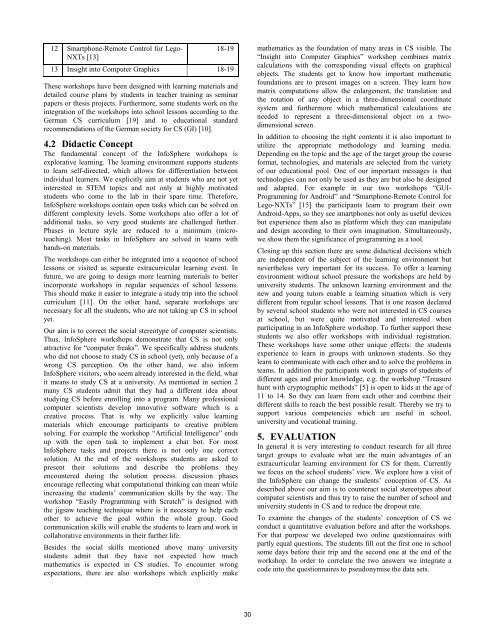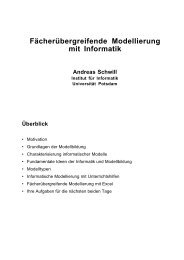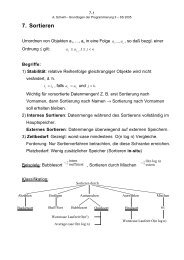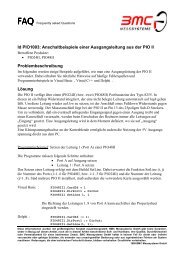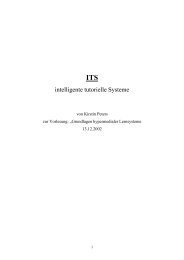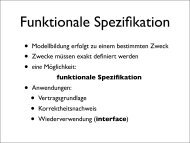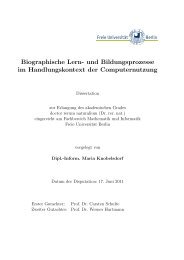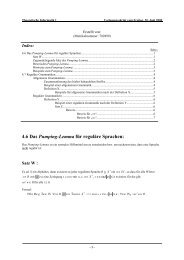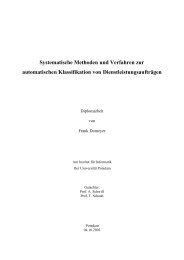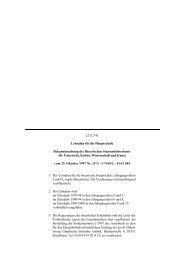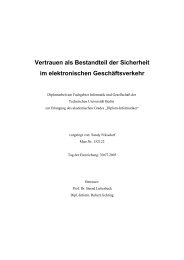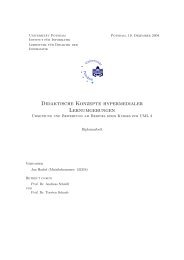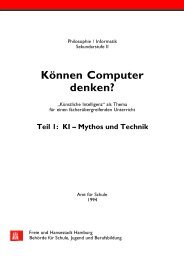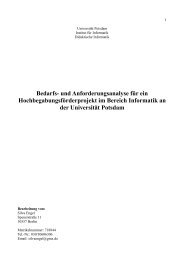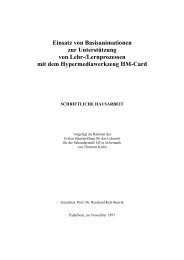Maria Knobelsdorf, University of Dortmund, Germany - Didaktik der ...
Maria Knobelsdorf, University of Dortmund, Germany - Didaktik der ...
Maria Knobelsdorf, University of Dortmund, Germany - Didaktik der ...
You also want an ePaper? Increase the reach of your titles
YUMPU automatically turns print PDFs into web optimized ePapers that Google loves.
12 Smartphone-Remote Control for Lego-<br />
NXTs [13]<br />
18-19<br />
13 Insight into Computer Graphics 18-19<br />
These workshops have been designed with learning materials and<br />
detailed course plans by students in teacher training as seminar<br />
papers or thesis projects. Furthermore, some students work on the<br />
integration <strong>of</strong> the workshops into school lessons according to the<br />
German CS curriculum [19] and to educational standard<br />
recommendations <strong>of</strong> the German society for CS (GI) [10].<br />
4.2 Didactic Concept<br />
The fundamental concept <strong>of</strong> the InfoSphere workshops is<br />
explorative learning. The learning environment supports students<br />
to learn self-directed, which allows for differentiation between<br />
individual learners. We explicitly aim at students who are not yet<br />
interested in STEM topics and not only at highly motivated<br />
students who come to the lab in their spare time. Therefore,<br />
InfoSphere workshops contain open tasks which can be solved on<br />
different complexity levels. Some workshops also <strong>of</strong>fer a lot <strong>of</strong><br />
additional tasks, so very good students are challenged further.<br />
Phases in lecture style are reduced to a minimum (microteaching).<br />
Most tasks in InfoSphere are solved in teams with<br />
hands-on materials.<br />
The workshops can either be integrated into a sequence <strong>of</strong> school<br />
lessons or visited as separate extracurricular learning event. In<br />
future, we are going to design more learning materials to better<br />
incorporate workshops in regular sequences <strong>of</strong> school lessons.<br />
This should make it easier to integrate a study trip into the school<br />
curriculum [11]. On the other hand, separate workshops are<br />
necessary for all the students, who are not taking up CS in school<br />
yet.<br />
Our aim is to correct the social stereotype <strong>of</strong> computer scientists.<br />
Thus, InfoSphere workshops demonstrate that CS is not only<br />
attractive for “computer freaks”. We specifically address students<br />
who did not choose to study CS in school (yet), only because <strong>of</strong> a<br />
wrong CS perception. On the other hand, we also inform<br />
InfoSphere visitors, who seem already interested in the field, what<br />
it means to study CS at a university. As mentioned in section 2<br />
many CS students admit that they had a different idea about<br />
studying CS before enrolling into a program. Many pr<strong>of</strong>essional<br />
computer scientists develop innovative s<strong>of</strong>tware which is a<br />
creative process. That is why we explicitly value learning<br />
materials which encourage participants to creative problem<br />
solving. For example the workshop “Artificial Intelligence” ends<br />
up with the open task to implement a chat bot. For most<br />
InfoSphere tasks and projects there is not only one correct<br />
solution. At the end <strong>of</strong> the workshops students are asked to<br />
present their solutions and describe the problems they<br />
encountered during the solution process. discussion phases<br />
encourage reflecting what computational thinking can mean while<br />
increasing the students’ communication skills by the way. The<br />
workshop “Easily Programming with Scratch” is designed with<br />
the jigsaw teaching technique where is it necessary to help each<br />
other to achieve the goal within the whole group. Good<br />
communication skills will enable the students to learn and work in<br />
collaborative environments in their further life.<br />
Besides the social skills mentioned above many university<br />
students admit that they have not expected how much<br />
mathematics is expected in CS studies. To encounter wrong<br />
expectations, there are also workshops which explicitly make<br />
30<br />
mathematics as the foundation <strong>of</strong> many areas in CS visible. The<br />
“Insight into Computer Graphics” workshop combines matrix<br />
calculations with the corresponding visual effects on graphical<br />
objects. The students get to know how important mathematic<br />
foundations are to present images on a screen. They learn how<br />
matrix computations allow the enlargement, the translation and<br />
the rotation <strong>of</strong> any object in a three-dimensional coordinate<br />
system and furthermore which mathematical calculations are<br />
needed to represent a three-dimensional object on a twodimensional<br />
screen.<br />
In addition to choosing the right contents it is also important to<br />
utilize the appropriate methodology and learning media.<br />
Depending on the topic and the age <strong>of</strong> the target group the course<br />
format, technologies, and materials are selected from the variety<br />
<strong>of</strong> our educational pool. One <strong>of</strong> our important messages is that<br />
technologies can not only be used as they are but also be designed<br />
and adapted. For example in our two workshops “GUI-<br />
Programming for Android” and “Smartphone-Remote Control for<br />
Lego-NXTs” [15] the participants learn to program their own<br />
Android-Apps, so they see smartphones not only as useful devices<br />
but experience them also as platform which they can manipulate<br />
and design according to their own imagination. Simultaneously,<br />
we show them the significance <strong>of</strong> programming as a tool.<br />
Closing up this section there are some didactical decisions which<br />
are independent <strong>of</strong> the subject <strong>of</strong> the learning environment but<br />
nevertheless very important for its success. To <strong>of</strong>fer a learning<br />
environment without school pressure the workshops are held by<br />
university students. The unknown learning environment and the<br />
new and young tutors enable a learning situation which is very<br />
different from regular school lessons. That is one reason declared<br />
by several school students who were not interested in CS courses<br />
at school, but were quite motivated and interested when<br />
participating in an InfoSphere workshop. To further support these<br />
students we also <strong>of</strong>fer workshops with individual registration.<br />
These workshops have some other unique effects: the students<br />
experience to learn in groups with unknown students. So they<br />
learn to communicate with each other and to solve the problems in<br />
teams. In addition the participants work in groups <strong>of</strong> students <strong>of</strong><br />
different ages and prior knowledge, e.g. the workshop “Treasure<br />
hunt with cryptographic methods” [5] is open to kids at the age <strong>of</strong><br />
11 to 14. So they can learn from each other and combine their<br />
different skills to reach the best possible result. Thereby we try to<br />
support various competencies which are useful in school,<br />
university and vocational training.<br />
5. EVALUATION<br />
In general it is very interesting to conduct research for all three<br />
target groups to evaluate what are the main advantages <strong>of</strong> an<br />
extracurricular learning environment for CS for them. Currently<br />
we focus on the school students’ view. We explore how a visit <strong>of</strong><br />
the InfoSphere can change the students’ conception <strong>of</strong> CS. As<br />
described above our aim is to counteract social stereotypes about<br />
computer scientists and thus try to raise the number <strong>of</strong> school and<br />
university students in CS and to reduce the dropout rate.<br />
To examine the changes <strong>of</strong> the students’ conception <strong>of</strong> CS we<br />
conduct a quantitative evaluation before and after the workshops.<br />
For that purpose we developed two online questionnaires with<br />
partly equal questions. The students fill out the first one in school<br />
some days before their trip and the second one at the end <strong>of</strong> the<br />
workshop. In or<strong>der</strong> to correlate the two answers we integrate a<br />
code into the questionnaires to pseudonymise the data sets.


